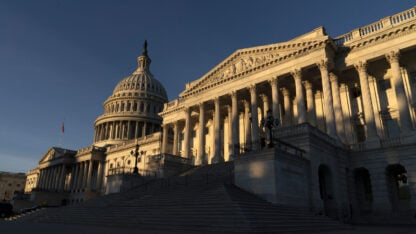Despite a strong economy and record employment numbers in Georgia, the Governor has still mandated budget cuts across many state agencies.
Why?
Speaking to lawmakers Tuesday, the state’s economist, Jeffrey Dorfman, said enrollment-based programs like public education and Medicaid are growing quicker than state revenues.
The reasons for those slowing revenues, Dorfman said, include a 2018 state income tax rate cut and a change in the motor vehicle title tax, which shifted some revenue to county governments.
“Now that does not say it is a bad thing,” he said of the income tax rate cut.
“Many of us in this room are quite happy to have citizens have their money rather than us keep their money for them, but it does mean there is less in state coffers for us to put in the budget.”
At the same time, he explained, about 80% of the budget is comprised of programs on “auto-pilot,” like public education and Medicaid. And those programs, he said, are growing faster than state revenues.
“So, in order to have the budget match revenue growth, if some things grow faster than the average, other things need to grow slower or be cut. That’s just how math works,” Dorfman said.
“Given the additional funding the legislature is providing for education and public health, there simply is not as much money left for things we have not made as much of a priority.”
How to grow those revenues? Given the record employment numbers, at this point, he said, growth could only come from “stealing” it from elsewhere, by recruiting companies and new population.
And that would not happen, he suggested, by making an additional state income tax rate cut, which state lawmakers have the option to do this session.
“I don’t believe the way you get companies to move to Georgia is by lowering the income tax rate. The reality is once we add our federal and state income tax rates together, a quarter percent one way or the other on the state income tax rate just doesn’t move the bar,” he said.
“Thinking about smart ways to attract businesses, like keeping our rating as the number one state to do business, removing needless regulations, speeding up the permitting process, these are the things we need to do.”
Lawmakers also heard from several state agency heads about how they have managed to comply with the budget cuts, including eliminating vacant positions, laying off workers and trimming expenses. More officials will testify Wednesday and Thursday.
Agriculture Commissioner Gary Black spoke with a somber tone. He said the department has cut 18 “critical” full time and seven vacant part-time positions and laid off six positions in departments including food safety, animal inspection and marketing.
“Over the next 18 months, there will be fewer food safety inspections. There’ll be fewer animal industry inspections,” he said. “The span between fuel pump and scale inspections will grow and the growing demand for meat inspections will have to shift to our federal partners.”
He also pointed out that if the department does not secure $1 million for its industrial hemp program, it will not be approved by the federal government.
“It is of no personal comfort to me that I share [this] with you, but it is truthful, and it is accurate,” he said.









